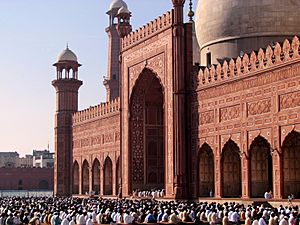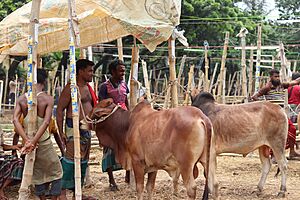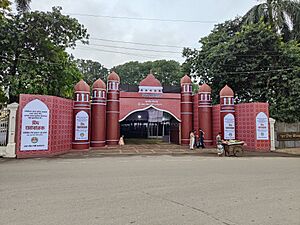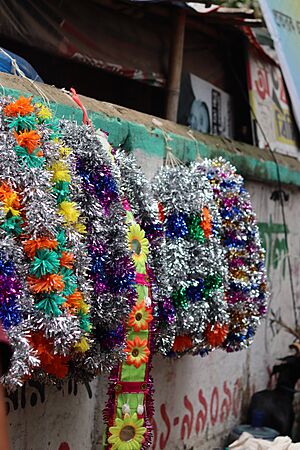Eid al-Adha facts for kids
Quick facts for kids Eid al-Adha |
|
|---|---|
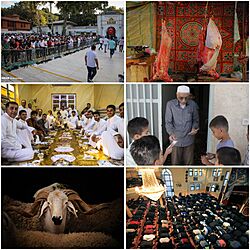
|
|
| Also called | The Major Festival |
| Observed by | Muslims |
| Type | Islamic |
| Significance | |
| Celebrations | Eid prayers, sacrificing animals, gift-giving (Eidi), festive meals, family and social gatherings, symbolic decoration, charity |
| Date | 10–13 Dhu al-Hijjah |
| 2025 date | 6 June – 9 June (West Asia, Europe, North America) 7 June – 10 June (North Africa, South Asia and Southeast Asia) |
| 2026 date | 27 May – 30 May |
| Duration | 4 days |
| Related to | Hajj, Eid al-Fitr |
Eid al-Adha is one of the two most important festivals in Islam, along with Eid al-Fitr. Its name means "Feast of the Sacrifice." It is celebrated to remember the story of the prophet Abraham's great faith and trust in God.
The festival begins on the 10th day of Dhu al-Hijjah, which is the twelfth and last month of the Islamic calendar. The celebration usually lasts for four days. Eid al-Adha also marks the end of the Hajj, the special journey or pilgrimage that many Muslims make to the city of Mecca.
Contents
The Story of Eid al-Adha
The story behind Eid al-Adha comes from the Quran. It tells of the prophet Abraham (known as Ibrahim in Arabic). God decided to test Abraham's faith by commanding him in a dream to sacrifice his son, Ishmael.
Abraham loved his son very much, but he was willing to obey God's command. He told his son about the dream, and Ishmael, who also had strong faith, agreed that his father should do what God asked.
Just as Abraham was about to perform the sacrifice, the angel Gabriel (Jibreel) called out to him, telling him he had passed the test. God was pleased with Abraham's obedience and sent a ram to be sacrificed instead of his son.
This story teaches Muslims about the importance of faith, obedience, and trust in God. It also shows God's mercy. To remember this event, Muslims who are on the Hajj pilgrimage throw small stones at pillars that represent the temptations that tried to stop Abraham.
How Is Eid al-Adha Celebrated?
Muslims around the world celebrate Eid al-Adha with prayers, feasts, charity, and time with family and friends.
Special Prayers and Greetings
On the morning of Eid, people dress in their best clothes and gather for a special prayer. This prayer is held in large groups at a mosque or in an open field called an Eidgah.
After the prayer, people greet each other with hugs and say "Eid Mubarak," which means "Blessed Eid" or "Happy Eid." It is a time for forgiveness and coming together as a community.
The Tradition of Qurbani
A central part of Eid al-Adha is the Qurbani (or Udhiyah), which means sacrifice. To honor the story of Abraham, families who can afford it will sacrifice an animal, such as a sheep, goat, or cow.
The meat from the animal is shared. It is divided into three equal parts:
- One part is for the family.
- One part is given to friends and relatives.
- One part is given to people who are poor or in need.
This tradition makes sure that everyone can enjoy a special meal during the festival. It is an important act of charity and sharing.
Family, Food, and Gifts
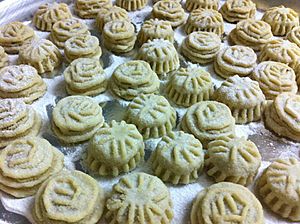
Eid is a happy time for families. People visit their relatives and friends to celebrate together. They share large, festive meals with special dishes. In some parts of the world, people bake special cookies like ma'amoul.
It is also a tradition to give gifts. Children often receive money or presents from older relatives. This gift is known as Eidi.
Celebrations Around the World
While the main traditions are the same, people in different countries have their own unique ways of celebrating Eid al-Adha.
In Bangladesh
In Bangladesh, Eid al-Adha is a major holiday. Many people who work in big cities travel back to their hometowns to celebrate with their families. Special markets are set up to sell animals for the Qurbani. People enjoy traditional meat dishes like Kala bhuna and share special snacks with guests.
In Pakistan
In Pakistan, women and girls often decorate their hands with beautiful patterns using henna. Children look forward to receiving Eidi (money and gifts) from their elders. Families gather for big meals and celebrate together.
In the Middle East and Africa
In many countries in the Middle East, families prepare traditional sweets and pastries to share with visitors. In several African nations, it is common to exchange gifts with friends and invite family over for large feasts. No matter the culture, the main ideas of giving, family, and celebration are shared by all.
Why Does the Date of Eid Change?
You may notice that Eid al-Adha falls on a different day each year on the standard calendar. This is because the Islamic calendar is a lunar calendar, which is based on the cycles of the Moon.
The calendar used by most of the world is the Gregorian calendar, which is a solar calendar based on the Earth's trip around the Sun. A lunar year is about 11 days shorter than a solar year. Because of this difference, Islamic holidays like Eid al-Adha move back by about 11 days each year on the Gregorian calendar.
See also
 In Spanish: Eid al-Adha para niños
In Spanish: Eid al-Adha para niños
 | Calvin Brent |
 | Walter T. Bailey |
 | Martha Cassell Thompson |
 | Alberta Jeannette Cassell |


